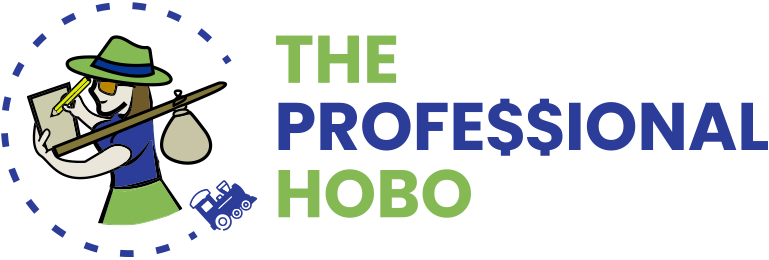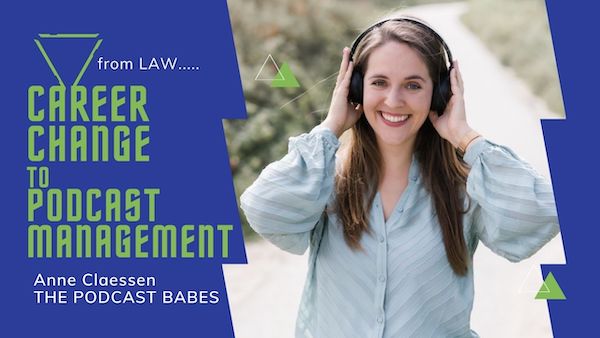What happens when you bust your butt to get a Master’s Degree in Law and Business, then graduate and realize the “dream job” you’ve been offered in corporate law isn’t actually what you want to do? Well, if you’re Anne Claessen, you go backpacking for a year, and realize what you actually want to be is an entrepreneur.
In this interview, Anne shares her entrepreneurial journey with us, including how she chose podcast management as the thing she wanted to do, how she initially structured her business as a freelancer before rebranding as an entrepreneur (and the differences therein), how she built her company The Podcast Babes 100% remotely while traveling full-time, and why she eventually decided to get a home base.
Other Interviews You’ll Want to Watch:
Pivoting to Podcasting, with Gary Arndt
Being a Remote Employee vs Remote Entrepreneur with Victoria Puzach
Transitioning to Remote Freelance Work in Your 40s | Susan Portnoy, The Insatiable Traveler
Pros and Cons of Being a Digital Nomad vs Having a Home Base, with Sherry Ott
Jump right into my Awesome Interview Series videos on YouTube here – and please give it a thumbs up, leave comments and subscribe!
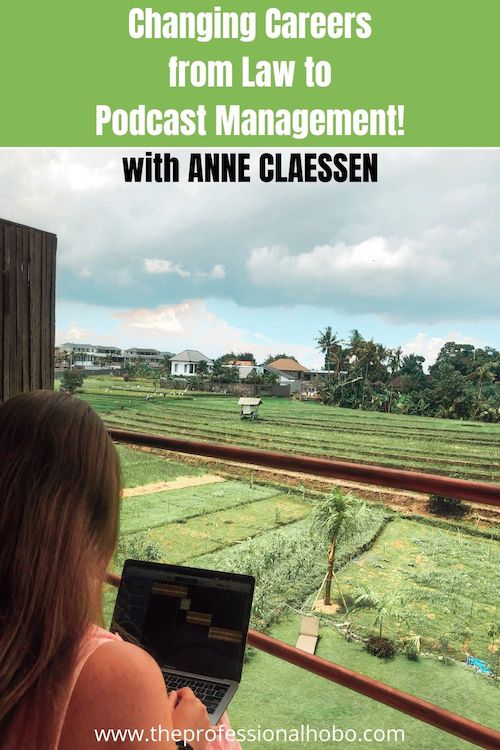
Meet Anne Claessen
Anne Claessen started her digital nomad journey in 2018 after studying long and hard to get her Master’s Degree in both Law and Business. She turned down the ‘dream job’ at a big law firm to travel the world. After a year of backpacking and working crappy jobs, it was time to follow her dream and start a business of her own.
She chose podcasting management as her area of expertise, and built The Podcast Babes from the ground up (with a few iterations thrown in there for good measure). After running her business while traveling full-time, Anne now has a home base in Hamburg, Germany, from where she travels as a part-time nomad and runs her podcast agency.
In this interview we get into the details of Anne’s life and career journey, as well as her travel lifestyle and how all three have evolved over time.
Click here to watch the interview on YouTube, or just hit play below. If you go over to YouTube, I immensely appreciate a thumbs up and/or a comment. This is the #1 thing you can do to help my video get exposure to other people like you!
Step One: The Career Crisis
The first step to Anne’s total lifestyle and career makeover was a career change – which really started as a career crisis. With a Law and Business degree in her pocket and a trajectory towards corporate law, the “dream job” on the table inspired a gut check, at which point she realized she didn’t want this career or lifestyle. Anne talks about:
- What it feels like to have “career blinders” on.
- Why she decided corporate law wasn’t her jam.
- But if not law, then what? And what it was like to feel totally lost.
- In Law school you have “failed” if you don’t immediately become a lawyer. She had to face the idea of failure as perceived by her fellow students, as well as the expectations of friends and family.
Step Two: Getting Some Space and Clarity
Anne had heard about the digital nomad lifestyle through listening to podcasts (of which she was a voracious consumer) while in University. She always dismissed it as a lifestyle for somebody else, but not her.
In conversation with a friend who was planning a gap year in Australia, Anne was inspired to get away herself and join her friend and get a working holiday visa. En route, they backpacked through Southeast Asia. Here’s what this time out for travel revealed for Anne:
- Travel gave her a chance to be away from the expectations of friends and family.
- With this space and time she realized she wanted her own business.
- Anne always thought she’d do it “one day” in an indefinite future, but realized now was the best time, without anything tying her down.
- If not now, then “what am I waiting for?”
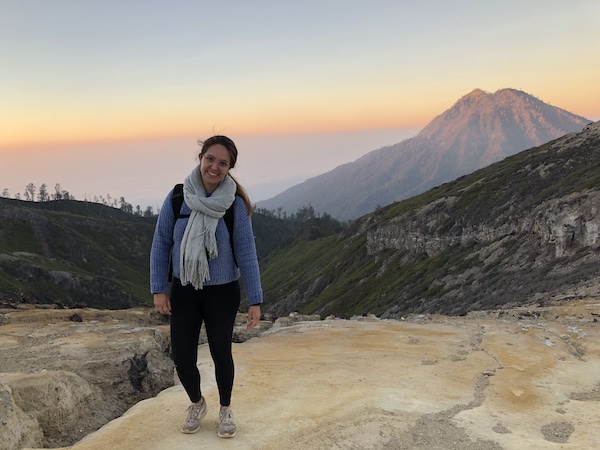
Starting a Business, and Freelancing vs. Entrepreneurial Model
I assumed a Masters in Business would have helped her in starting her own business. But initially at least, Anne found her Business Degree was actually counterproductive to entrepreneurship. After a while however, she realized that her business school and travel experience gave her skills like flexibility, the ability to identify patterns, and the power to embrace change.
But Anne’s business journey was far from a straight line from A to B (and frankly, it never is). She shares things like:
- How her family initially reacted to her business venture, and how that has evolved (and in some cases, not evolved).
- In searching for a business idea, she took a course to be a VA (virtual assistant). She says it’s a really good starting point, because no matter what you’re doing in the online space, you’re offering a service – which makes you a VA.
- The module on podcast management caught Anne’s attention, and despite being a fan, she never considered it a career possibility.
- She started off as a freelancer and worked as such for a year.
- Getting screwed over by her biggest client who breached the contract and eliminated 70% of her income overnight forced Anne to reevaluate her business model.
- Freelancing meant relying too much on clients, and spending all her time working on other people’s businesses. She was also spending a lot of time doing tasks she didn’t enjoy.
- Seeing how her freelance clients ran their podcasts gave her a wealth of knowledge of what works and doesn’t work behind the scenes, and she wanted to share this knowledge.
- So she fired her freelance clients, rebranded as The Podcast Babes, started a mastermind, and worked 1-on-1 with new clients on monetization strategies and podcast management (podcast management rarely being a good use of a podcaster’s time).
- As CEO of The Podcast Babes, she outsourced the tasks she didn’t enjoy or do well, and focused on the things that she loved.
- The differences between freelancing and the entrepreneurial model are subtle, but for Anne it feels very different.
- Being an entrepreneur means is like being a manager with top-down decision making responsibilities.
The Podcast Babes, and Employee Management
The Podcast Babes helps podcasters to monetize their podcasts, before they have thousands of downloads. She does that by offering masterminds, online courses, and DFY (done-for-you) podcast production with her team. We discussed:
- How people can monetize podcasts before having big download numbers.
- Profitable alternatives to sponsorships.
- The advantages of having a podcast as a way to develop relationships with clients and prospective clients for products and services you already offer.
- She encourages her clients to ask themselves how they can serve their listeners even more.
- How she hires new employees, and evaluates how effective employees are to help them improve or let them go.
- Advice for incorporating some kind of instructions for job applicants that will immediately weed out those who haven’t actually read the job description.
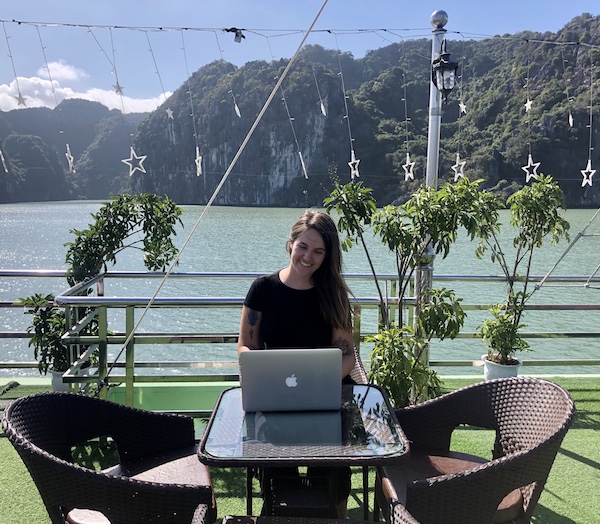
Building an Online Business While Traveling Long-Term
Anne reiterated what I (and anybody who has tried traveling whilst building a business) experienced: building an online business is not a good fit for a fast-moving travel lifestyle! Lucky for Anne, she already got her travel “backpacking” desires out of her system, and she was ready for slow travel. Here’s what she did:
- Locked herself in a place in Hanoi to get everything off the ground.
- This forced her to concentrate, but there was no remote community to connect with. Staying in an AirBnB was lonely to boot.
- Afterwards she visited DaNang (Vietnam – close to Hoi An where I spent six weeks) where there was a huge community that helped her build her business more effectively.
- She recommends going somewhere with a strong digital nomad community to meet people and learn from them (and have a social outlet).
- Find a digital nomad meetup at your destination; it’s so easy to make friends and contacts (even as an introvert).
Why Anne Got a Home Base After Three Years of Travel
At the time of our conversation, Anne and her boyfriend had just recently gotten an apartment together. She goes into how she met her partner in Thailand and why they returned to Hamburg from Bali during the pandemic.
Spoiler alert: relationships often put a new spin on the travel lifestyle, sometimes because of career incompatibilities. My past relationships often changed how I traveled and the places I called “home” for a while. Beyond circumstance, here’s what Anne had to say:
- Their apartment isn’t too expensive, such that they will be able to travel after the pandemic (and when her boyfriend has a remote career) without having to let it go.
- The advantages of having a base (with comforts, like a blender!) and the ability to travel short and long-term from this base.
- The pandemic necessitated that most nomads hunker down somewhere, and in many cases that has meant getting a home base.
- How another digital nomad she knows cites having a home base as “dabbling with commitment” and “growing up”.
- I didn’t resonate with the above point at all (but I started my own digital nomad lifestyle much older than she and her friend and had already “grown up”). So we discuss the idea of commitment and “growing up” and what that means for digital nomads of various ages and generational backgrounds.
- While lifestyle design is amazing in that you can have a home base, or not, or live here, or there, or do this, or that…it’s also a burden of decision-making. And having a home base can alleviate some of that burden.
This is just a summary! Remember to check out the full video here and leave a comment with your feedback!
